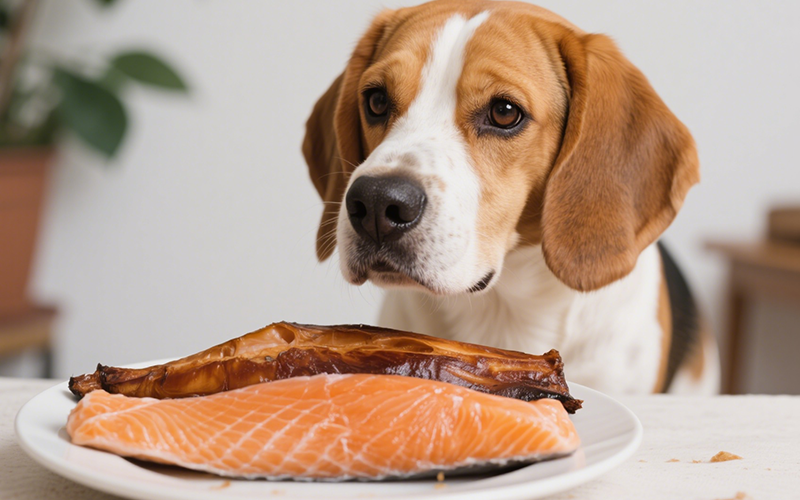Can Dogs Eat Smoked Salmon? Here's What You Need to Know
- 9 Apr 2025 14:44
Salmon is often hailed as a superfood for humans due to its omega-3 fatty acids and health benefits. But when it comes to your dog, is smoked salmon a safe treat? While salmon itself can be a healthy food for dogs, smoked salmon should be approached with caution.

The Risks of Smoked Salmon for Dogs 🚫
While plain, cooked salmon is generally safe and beneficial for dogs, smoked salmon comes with some concerns:
High Salt Content 🧂
Smoked salmon is typically high in sodium, which can be harmful to dogs in large amounts. Too much salt can lead to salt poisoning, which causes symptoms like vomiting, diarrhea, tremors, and even seizures. Excessive salt intake can also strain your dog’s kidneys over time.Preservatives and Additives 🛑
Smoked salmon may contain preservatives, artificial flavors, or spices like garlic or onion powder, which are toxic to dogs. Garlic and onion can damage a dog’s red blood cells and lead to anemia. Always check the ingredients to make sure the smoked salmon doesn’t contain harmful substances.High in Fat 🍖
Smoked salmon is also high in fat, which can lead to weight gain and contribute to pancreatitis in dogs. While healthy fats are beneficial, too much fat can overwhelm your dog’s digestive system, especially in smaller dogs or those with sensitive stomachs.Risk of Bone Fragments 🦴
Like all fish, smoked salmon may contain small bones that can pose a choking hazard or cause injury to your dog’s throat or digestive tract.
When Can Dogs Eat Smoked Salmon? ✅
If you want to share a bit of smoked salmon with your dog, here are some things to keep in mind:
Moderation is Key ⚖️
If you choose to give your dog smoked salmon, it should be a rare treat. A small bite here and there is fine, but don’t make it a regular part of your dog’s diet. The high salt content and preservatives mean it should only be an occasional indulgence.Plain, Cooked Salmon is Better 🍽️
If you’re looking to share the benefits of salmon with your dog, it’s much better to give them plain, cooked salmon without any added salt, spices, or preservatives. Grilled or baked salmon without any seasoning is a safer option for dogs.Remove Bones and Skin 🦴
Always ensure that any fish you offer your dog is boneless and skinless to avoid choking hazards and digestive issues. Fish bones can be sharp and dangerous if swallowed.Watch for Allergic Reactions 🚨
Some dogs may have sensitivities or allergies to fish. If you’re introducing salmon to your dog’s diet, start with a small amount and watch for any signs of digestive upset or allergic reactions, such as itching, swelling, or vomiting.
Healthier Alternatives to Smoked Salmon 🦴
If your dog enjoys the taste of fish, here are some healthier alternatives to smoked salmon:
Plain Cooked Salmon 🍣
Cooked, unseasoned salmon is an excellent source of omega-3 fatty acids, which promote a shiny coat and healthy skin. It’s great for dogs with joint problems too. Just make sure to remove all bones.Canned Salmon (in water) 🐟
If you don’t have fresh salmon, canned salmon in water (not oil) can be a good option. It’s important to check that it doesn’t contain any added salt or seasoning.Sardines 🐠
Sardines are a smaller, more manageable fish option for dogs, and they’re packed with nutrients like omega-3s and protein. They can be given fresh or in water-packed cans (without oil or added salt).Tuna (in water) 🐟
Tuna is another fish option that provides omega-3s, but it should be given in small quantities since tuna can also be high in mercury. Always choose water-packed tuna and avoid any oil or seasoning.Fish Oil 🧴
If you’re looking to boost your dog’s omega-3 intake, fish oil supplements are available and can be a great way to give your dog the benefits of fish without the risks of raw or smoked varieties.
How PettureX Can Help 🧠
If you’re ever unsure about what foods are safe for your dog, or if you need guidance on your dog’s overall health, PettureX is a great resource. With 24/7 online consultations and pet image recognition, PettureX can provide real-time assistance and help you make informed decisions about your dog’s diet and well-being.
Conclusion: Can Dogs Eat Smoked Salmon? ✅
While smoked salmon is not ideal for dogs due to its high salt content, preservatives, and fat, a small bite on rare occasions might not hurt. However, plain, cooked salmon is a much safer and healthier alternative that provides the nutritional benefits of fish without the added risks.
As always, if you're ever uncertain about your dog’s diet, PettureX can offer personalized advice and guidance to help you keep your furry friend healthy and happy.
Need help with your dog’s diet or health? Try PettureX for expert advice anytime! 🐶💚
Related

Can Dogs Eat Peaches? Vet Explains Benefits, Cyanide Risks & Safe Serving
- 16 Apr 2025
Can Dogs Eat Mulberries? Vet Explains Safety, Benefits & Potential Risks
- 16 Apr 2025
Can Dogs Eat Mozzarella? Vet Explains the Cheesy Truth (Risks & Benefits)
- 16 Apr 2025
Can Dogs Eat Maple Syrup? The Sugary Truth & Why Vets Advise Against It
- 16 Apr 2025
Can Dogs Eat Mango Skin? Vet Explains Why It's a Risky Chew!
- 16 Apr 2025
Can Dogs Eat Mac n Cheese? Vet Explains Why This Comfort Food Is Unsafe!
- 16 Apr 2025
Can Dogs Eat Liver? Vet Guide to This Nutrient-Dense Organ Meat (Benefits & Risks!)
- 16 Apr 2025
Can Dogs Eat Lamb? Vet Insights on This Nutritious Meat Option
- 16 Apr 2025
Can Dogs Eat Licorice? The Sweet Danger & Glycyrrhizin Risk Explained by Vets
- 16 Apr 2025
Can Dogs Eat Jelly? The Sweet Truth About Sugar, Xylitol & Why Vets Say No!
- 16 Apr 2025
